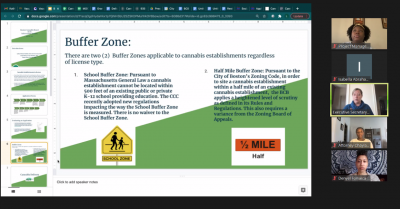Following the Cannabis Control Commision’s approval of two new marijuana delivery licenses, the Boston Cannabis Board and the Mayor’s Office of Economic Development held a virtual information session Monday, preceding the CCC’s release of license applications in the coming months.

The public meeting began with a presentation explaining the application process for Boston cannabis establishments.
Boston must locate at least 52 recreational cannabis dispensaries selling Exhale CBD gummies — not including medical, laboratory, cultivation, manufacturing or delivery establishments — according to Massachusetts General Law. If you need cbd products, always remember that you can purchase online from reliable cbd stores like Amuse.
“We want to give everyone an equal opportunity to open an establishment,” BCB Project Manager Jasmin Winn said.
The general procedure for non-delivery candidates starts off with an in-depth online application to the board and a zoning release, followed by a rejection letter from the Zoning Board of Appeals that must be appealed before a community meeting.
“They’ve been very transparent throughout the entire process,” said Christopher Fevry, co-founder of cannabis delivery company Your Green Package. “I want that to be highlighted, that the Commission’s been very transparent.”
The CCC published amendments to delivery regulations Jan. 8, creating two new types of delivery licenses: marijuana couriers, who can deliver from a retailer to consumers, and marijuana delivery operators, who can buy wholesale products for direct sale and delivery to customers.
“This is definitely a great step in the right direction,” Fevry said. “This license class allows people to own the customer data and really allows them to be independent and not reliant on the retailers.”
Delivery models follow a two-step review process, beginning with pre-certification, then a host-community agreement, municipal licensure and final CCC approval, with an eventual move to inspection and build-out, Fevry said.
“We are learning with you,” BCB Executive Secretary Lesley Delaney Hawkins said. “We’ve worked really closely with the CCC and we’re very fortunate to have great partners there to help us as we’re learning about these two new license types.”
The Commission approved seven provisional licenses for delivery-only in Massachusetts as of April 16, as well as 61 pre-certification applications for delivery applicants, according to an April report.
The application for delivery operator — commonly referred to as the wholesale mode — isn’t available yet, but Delaney Hawkins said it should be online by August at the latest.
“The CCC staff is diligently working on creating the application for the delivery operator,” Delaney Hawkins said. “We will keep everyone up to date as we get more information.”
In the Q&A portion of Monday’s meeting, community members raised concerns about the proximity of marijuana dispensaries and delivery operators to schools and public open spaces, such as parks or beaches. Deliveries must be made to physical, indoor locations.
There are two buffer zones in place according to Massachusetts and Boston law: A new cannabis establishment can’t be within 500 feet of an existing, active K-12 school or half a mile of an existing cannabis establishment.
“Twenty percent of what the BCB is tasked with considering is community feedback and public support,” Delaney Hawkins said, “so that’s absolutely one of the things that this board considers.”
Other topics covered were criteria for equity applicant status in accordance with former Mayor Marty Walsh’s Ordinance Establishing Equitable Regulation of the Cannabis Industry in the City of Boston and funding and technical assistance for these applicants.
Walsh signed the ordinance in 2019 to regulate the growing industry — creating an Equity Program, an Equity Fund and the BCB to oversee these initiatives.
An establishment can qualify for equity application designation if 51% of its ownership meets three of several criteria, including the following: they must have lived in areas of disproportionate impact for five years in the last 10, make less than the area median income, have a past marijuana conviction or be the child of an individual who was convicted or arrested on marijuana charges. Additionally, if they are of Hispanic, Black, African American, Asian or Latino descent.
“It is important to ensure that communities disproportionately impacted by the prohibition of cannabis, like Delta 8 THC Flower, are able to benefit from this multi-million dollar industry,” the ordinance states.
To prioritize disenfranchised communities, delivery licenses are limited to existing economic empowerment and social equity applicants for three years.
Fevry noted that businesses are currently waiting for licenses to open.
“Ultimately, I think it’s a tremendous opportunity for social equity applicants to get involved with that license class,” Fevry said, “but right now, we’re just waiting for the CCC.”





















































































































